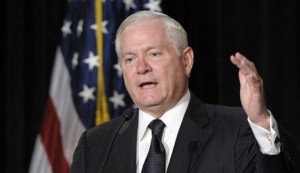 The arguments for and against the Obama administration�s anticipated nomination of Chuck Hagel for defense secretary seem to turn on the premise that he would represent a dramatic shift on defense spending and on two major foreign policy issues: Iran and Israel. The merits of those policies aside for the moment, let�s look at the �dramatic shift� component of this thinking. How do Hagel�s positions compare with those of former defense secretary Robert M. Gates?
The arguments for and against the Obama administration�s anticipated nomination of Chuck Hagel for defense secretary seem to turn on the premise that he would represent a dramatic shift on defense spending and on two major foreign policy issues: Iran and Israel. The merits of those policies aside for the moment, let�s look at the �dramatic shift� component of this thinking. How do Hagel�s positions compare with those of former defense secretary Robert M. Gates?President George W. Bush appointed Gates, a former CIA chief, to run the Pentagon in 2006. He took over as the Iraq War was at its low point, replacing a disgraced Donald Rumsfeld. Gates, like Gen. David Petraeus, became so celebrated for helping to turn around the Bush administration�s Middle East policy that President Obama kept them both on for years. Gates remained defense secretary until 2011. Like Hagel, Gates is considered a foreign policy realist and a moderate Republican. He is famous for drawing down in Iraq, arguing against the Libya intervention and for, during the Cold War, expressing skepticism that Mikhail Gorbachev was a true reformer (he was).
Here�s how Hagel and Gates stack up on defense spending, Iran, and Israel. The bottom line is that the two are remarkably similar and appear to share a number of policy preferences on these issues, as well as a similar worldview. The one place where I could find real daylight between the two is on Iran sanctions, which Hagel has in the past opposed but Gates supported. This is an odd position for Hagel, given that sanctions could forestall the sort of unilateral Israeli military strike that he, like Gates, so opposes. Otherwise, though, it�s hard not to see Hagel as a continuation of the Gates Pentagon.
Israel
Hagel sometimes breaks with Israeli security policies:�The Jerusalem Post�runs down�those instances. He was �one of only four senators in October 2000 who would not sign a letter of support for Israel during the second intifada [a Palestinian uprising], being only one of 12 senators in 2006 who refused to sign a letter calling on the EU to place Hezbollah on its terrorist lists and signing a 2009 letter � after he retired from the Senate � urging Obama to negotiate with Hamas.�
Gates sometimes breaks with Israeli security policies:�In 2007, Gates�reportedly pushed Israel�to halt its plans for attacking a suspected nuclear site in Syria. Then-deputy national security adviser Elliott Abrams, not an ally of Gates, later�accused�him of urging Bush to leverage the entire U.S.-Israel relationship to halt the strike, which went ahead anyway.
Hagel has criticized Israel:�Hagel has been, as backer Stephen Walt put it, �outspoken in calling for the United States to be more evenhanded in its handling of the [Israel-Palestine] peace process.� But, for some Israel supporters, �more evenhanded� is nice way of saying that he�s less supportive. He also once�commented�that he was a senator from Nebraska, not a senator from Israel.
Gates has criticized Israel:�Gates reportedly counseled Obama that Israeli Prime Minister Benjamin Netanyahu was an ungrateful ally who was �endangering his country by refusing to grapple with Israel�s growing isolation and with the demographic challenges it faces if it keeps control of the West Bank,��according to a paraphrase�from Bloomberg columnist Jeffrey Goldberg. Gates also told Obama, according to Goldberg, that Netanyahu had given the United States nothing in return for its support of Israel.
Iran
Hagel formerly opposed a strike on Iran:�During the Bush administration, Hagel�stated several times�that he did not believe military strikes were a viable option for keeping Iran from developing a nuclear program. He has since softened and now says he supports Obama�s position, which is that military strikes are a viable but last-resort option.
Gates currently opposes a strike on Iran:�In a recent speech delivered after leaving the Pentagon, Gates came out strongly against a U.S. or Israeli strike. �Such an attack would make a nuclear-armed Iran inevitable. They would just bury the program deeper and make it more covert,��he said. �The results of an American or Israeli military strike on Iran could, in my view, prove catastrophic, haunting us for generations in that part of the world.�
Hagel has opposed Iran sanctions:�He has long argued that direct negotiations would be the best path for resolving the conflict. But he also voted several times�againstsanctioning Iran, warning that the sanctions would�undercut�diplomatic efforts.
Gates supports Iran sanctions:�In 2010, Gates�showed public support�for the U.S. and UN sanctions regimes, which he said were working. Even in his recent speech arguing against a strike, Gates called UN sanctions �our best chance going forward, to ratchet up the economic pressure and diplomatic isolation.�
Defense spending
Hagel wants to cut �bloated� defense budget:��The Defense Department, I think in many ways, has been bloated,� he�told the Financial Times�last year. �So I think the Pentagon needs to be pared down.�
Gates tried very hard to cut off �a gusher of defense spending�:�In 2010, he announced he would try to�cut $100 billion in defense spending�over five years, including $15 billion in 2012. �The attacks of Sept. 11, 2001, opened a gusher of defense spending that nearly doubled the base budget over the last decade,� he said in a speech that year. �Military spending on things large and small can and should expect closer, harsher scrutiny. The gusher has been turned off, and will stay off for a good period of time.�
By The Washington Post
The Iran Project is not responsible for the content of quoted articles.










